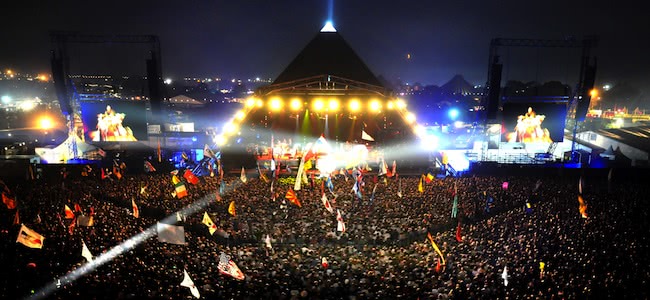Aussie music fans may already know that live music can mean big business for local economies. Such as Melbourne’s music scene recently blooming with a ‘bigger than AFL’ kick-back of $1.04 billion to the economy, while the likes of Bluesfest draws thousands of punters, and in turn, millions of dollars to Byron Bay each year.
That’s just locally, but what of one of the world’s music meccas? The historic home of The Beatles, the land of Glastonbury and Britpop: the United Kingdom.
A new industry report has found that the UK’s economy revelled in a boost of £2.2 billion last year as over 6.5 million tourists flew into Great Britain to attend gigs, concerts, and the country’s almighty music festival season in 2012.
The figures come from a new report entitled Wish You Were Here that was commissioned by official tourism agency VisitBritain and peak music body UK Music, as NME reports.
The stats shows that the 6.5 million music aficionados travelling to the UK to enjoy its musical scene pumped around £1.3 billion into the tourism and hospitality industry, while “additional spending along the supply chain generated by music tourists” (eg. alcohol, transport, food) added a further £914m.
The report adds that the huge music tourism spending figures is enough to sustain 24,000 jobs. The average music tourist hitting the UK to attend its many large-scale festivals – such as Glastonbury, Leeds, Reading, and The Great Escape, just to name a few – spend £910 while in the country. “This report will act as a catalyst for us all to ramp up our activity and forge better relationships with festival organisers, promoters, venues and producers…”
Those attending a live music show spend approximately £602. Meanwhile, domestic music tourists spend an average £396 while attending festivals and £87 going to concerts.
Love The Beatles?
Get the latest The Beatles news, features, updates and giveaways straight to your inbox Learn more
Other interesting stats from the Wish You Were Here report indicate that the average live music crowd in the UK is made up of 41% music tourists (which means you’re likely to bump into a fellow Aussie ex-pat at a concert), while London attracts the lion’s share of music tourists, 28% in fact, equating to around 1.8 music tourists to the capital.
It also found tourists were more likely to visit cafes and restaurants that were hosting live music, with 60% of the 300 people surveyed on this stat saying they’d spend more time and money in a venue if they were playing music. Interestingly, The Stone Roses’ reformation concert at Heaton Park alone generated over £20 million for Manchester’s local economy.
The music study is the most comprehensive into music tourism that has ever been researched, says UK Music’s Chief Excutive Jo Dipple.
“The total direct and indirect spend of £2.2bn is incredibly impressive in a year that had its own problems,” she tells Music Week, referecing a year that saw live music competing with the London 2012 Olympics, inclement weather, no Glastonbury Festival that year, and ongoing fallout from the GFC.
“The fact there are six-and-a half-million tourists is very impressive and the fact that 6% of overseas tourists spend 20% of the money is a great target for us and VisitBritain to get more overseas tourists here because they spend the most money,” adds Dipple.
Tory and Culture Minister Ed Vaizey added his enthusiasm for the Wish You Were Here report figures, saying: “music is without question an essential element of Britain’s tourism appeal… the huge financial contribution to the UK economy by the millions of music tourists to the UK annually makes it very clear that when combined, the music and tourism industries are powerful drivers for growth.”
VisitBritain chief executive Sandie Dawe noted that the impressive 2012 figures confirmed the “significant international appeal” of UK’s music scene. “This will act as a catalyst for us all to ramp up our activity and forge better relationships with festival organisers, promoters, venues and producers to raise awareness of our amazing music scene across the world,” says Mr Dawe.
Read UK Music and VisitBritain’s Wish You Were Here Music Tourism report in full here.




































